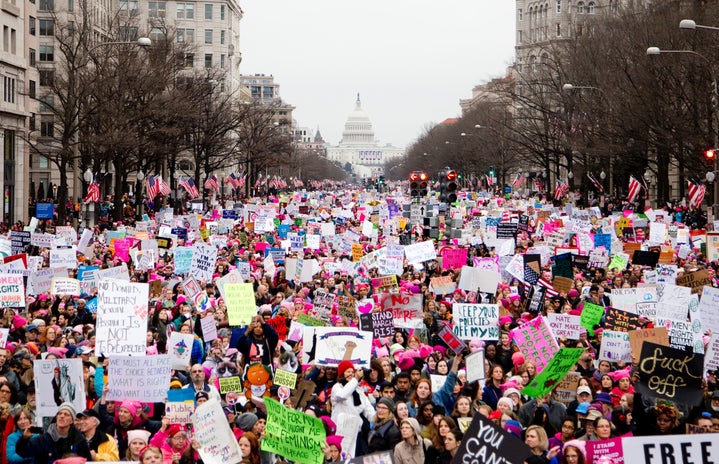TW: Domestic Violence and Sexual Harassment/Assault
Domestic violence awareness month falls in October every year, and it’s now November; so you may be wondering why this article wasn’t released two weeks ago.
One in three women have experienced some form of physical violence from an intimate partner. One in seven women have been injured by an intimate partner, yet less than two percent of offenders are convicted and go to prison. This means more than likely, you know someone that has experienced or is going through domestic violence from an intimate partner. You probably know a woman or have experienced yourself sexual abuse or harrassment.
In October, Old Dominion University’s (ODU) Women and Gender Equity Center collaborated with H.E.R. Shelter, based in Portsmouth to hold a donation drive, in which students could come and donate supplies for women and young children who had fled from domestically unsafe environments and were starting again. This month, HerCampus at ODU is hosting a panel called “Voices of Strength,” which will feature women who have survived domestic violence. This will take place on Nov. 9, from 4-5 p.m. at BAL 1012.
According to dosomething.org, 85% of domestic abuse victims are women, and a quarter of women worldwide are likely to experience a domestically violent relationship in their lifetime.
Erika Harrison-Bey (she/her, they/them) is assistant director of the Women and Gender equity center, a victim advocate and a two time domestic abuse survivor. They were kind enough to give some of their time to talk to us and explain why exactly domestic and interpersonal violence awareness is important.
Harrison-Bey said, “I think it’s important for young adults to know red flags; as a culture we don’t do a lot of education on healthy relationships and what they look like. So for people in college, where it may be their first time away from home, they’re going to be entering into some of their first real relationships which is an incredibly vulnerable time to be experiencing domestic violence. I knew that college students are deeply affected by interpersonal violence, because the age group of 18-25 – especially for women – is when most people experience that type of violence, and 57% of people who experienced domestic violence say that it happened while they were in college.”
“Unfortunately, this is something a lot of people don’t know how to talk about, or know where to turn for support if they experience it – because we know that most people don’t realize if they’re in a domestically violent relationship until after the fact. I’m just really passionate about education, awareness and more so prevention, because it doesn’t discriminate.’’
Being a victim doesn’t have a specific ‘look.’ There is no stereotype that we can create for the type of woman who suffers abuse at the hands of their partner, because it can happen to anyone, in any kind of relationship; whether this be same-sex, heterosexual or polygamous. It can happen to the pious preacher’s wife, and it can happen to the revered military commander. Nobody is exempt.
Domestic violence costs the US economy $8.3 billion every year, and between 21-60% of survivors of interpersonal intimate relationships lose their jobs to reasons stemming from the violence.
Harrison-Bey also said, “It’s really important to know about the non-profits in your area that are doing work with domestic violence survivors because they are grant funded, so they’re always going to be needing additional support from the community. Participate in whatever events they have to raise funds that go directly to survivors.”
“It can be challenging to help the people in your personal lives because their needs are so great, but it can be the little things; like helping them get an Uber if they have to go to court. Or watching their children if you know they can’t cover childcare that week, going to the grocery store with them and helping them get necessities for the week; and maybe just buying them a coffee if you know they’ve had a hard day. Little things that won’t necessarily break your back financially, but can make all the difference in letting a survivor know that they have support.’’
Harrison-Bey’s background as a crisis and trauma therapist and as a survivor has made her want to make sure that people don’t feel shame about experiencing domestic abuse and interpersonal intimate partner violence.
She wants to remind you that “It’s all about power and control. There is no fault within a victim who experiences this, that made them deserving of this type of abuse. I just want people to know that once you’re on the other side of it, you are still deserving of love, you are still deserving of compassion and kindness. You will ultimately find a relationship that pours back into you and nourishes you. This may take you years, but I want to say this: Abusive personalities make the choice to abuse, victims don’t choose to be victims.’’
“Long Shot” by Kennedy Ryan is a heart wrenching book that centers the topic of domestic violence at a young age too. There are trigger warnings of rape, domestic violence and sexual assault, so be mindful when reading; but is a great way to educate yourself on the circumstances surrounding it, and why it’s not always possible to ‘just leave.’
The National Domestic Violence Hotline number is 808-799-7233 and is available 24/7.


